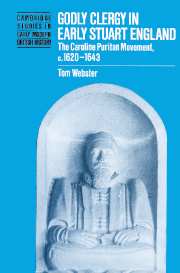Book contents
- Frontmatter
- Contents
- Acknowledgments
- List of abbreviations
- Introduction
- Part I Society, clerical conference and the Church of England
- 1 Clerical education and the household seminary
- 2 Profitable conferences and the settlement of godly ministers
- 3 Fasting and prayer
- 4 Clerical associations and the Church of England
- Part II The godly ministry: piety and practice
- Part III ‘These uncomfortable times’: conformity and the godly ministers 1628–1638
- Part IV ‘These Dangerous Times’: the Puritan Diaspora 1631–1643
- Index
- Cambridge Studies in Early Modern History
2 - Profitable conferences and the settlement of godly ministers
Published online by Cambridge University Press: 04 November 2009
- Frontmatter
- Contents
- Acknowledgments
- List of abbreviations
- Introduction
- Part I Society, clerical conference and the Church of England
- 1 Clerical education and the household seminary
- 2 Profitable conferences and the settlement of godly ministers
- 3 Fasting and prayer
- 4 Clerical associations and the Church of England
- Part II The godly ministry: piety and practice
- Part III ‘These uncomfortable times’: conformity and the godly ministers 1628–1638
- Part IV ‘These Dangerous Times’: the Puritan Diaspora 1631–1643
- Index
- Cambridge Studies in Early Modern History
Summary
A period of tuition in the household of a godly minister was plainly intended to be a temporary arrangement. The task of the seminaries was to fit young ministers for service in the parishes. It comes as no surprise, therefore, to find that clerical networks existed to promote the settlement of such ministers in appropriate posts. The placement of godly ministers was an abiding concern, one which, naturally, was one of the functions identified by Mather in his account of Thomas Hooker's work in Essex.
We noted earlier the refusal of Emmanuel to pursue impropriations for its graduates and fellows; in such circumstances, social networks fostered by profitable conferences were of paramount importance. The effect of such contacts is the heavy weighting of the college's geographical influence. The statutory preference for Essex and Northampton was not over-whelming, and it is in the networks of patronage and advice that we find the explanation of the dominance of these counties in the careers of Emmanuel graduates. Once connections had been built, their continued employment would tend to strengthen geographical biases. As Joan Schenk Ibish has shown in detail, this dominance, especially pronounced in Essex, was well established before our main period of interest. The number of ministers moving to Essex outweighed the numbers of Essex natives attending the college, the main effect of the statute, by four to one.
For a minister with a strong sense of pastoral calling, the translation from one post to another was not to be taken lightly: established channels of consultation reinforced concentrations of college men with every new generation.
- Type
- Chapter
- Information
- Godly Clergy in Early Stuart EnglandThe Caroline Puritan Movement, c.1620–1643, pp. 36 - 59Publisher: Cambridge University PressPrint publication year: 1997



